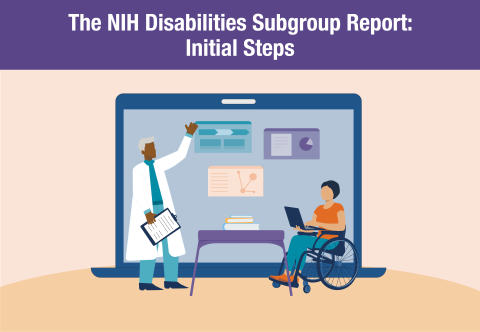
In late 2022, NIH leadership received the Disabilities Subgroup Report, containing recommendations NIH could implement to support disability equity and inclusion. I discussed the report in a prior blog post. Today's post describes NIH's initial steps in advancing the report’s suggestions.
Addressing the Report Recommendations
NIH published its Fiscal Years 2023–2027 Strategic Plan for Diversity, Equity, Inclusion, and Accessibility (DEIA) in March 2023. The DEIA Strategic Plan describes how NIH will advance DEIA across all agency activities. The Steering Committee DEIA Working Group oversees the DEIA Strategic Plan implementation, reporting through the Steering Committee to the NIH Principal Deputy Director and on to the Director. While the Disabilities Subgroup Report and the DEIA Strategic Plan were developed separately, their objectives are aligned.
NIH has tracked all recommendations in the Disabilities Subgroup Report and assigned each to an accountable NIH entity. NIH also established ways to address the few report recommendations that the DEIA Strategic Plan does not include.
For example, Acting NIH Director Larry Tabak, D.D.S, Ph.D., appointed an ad hoc group to reexamine the NIH mission statement in response to a recommendation that NIH amend it to be more inclusive of people with disabilities. As part of this process, NIH anticipates publishing a Request for Information to gather public input on how it might approach this recommendation.
In addition, the Steering Committee DEIA Working Group established a Disabilities Subgroup to address recommendations without a discrete owner within NIH. The subgroup will address items such as changing culture, addressing ableism, and examining research gaps. Its co-leads are strategizing the subgroup's focus and determining its membership.
Other Initiatives to Enhance Disability Inclusion
Additional NIH progress toward enhancing disability inclusion includes a research concept, Health Disparities Experienced Among Persons Living with Disabilities, approved by the National Advisory Council on Minority Health and Health Disparities (NACHMD) in September 2022. The concept aims to support novel research that adds to understanding of the intersectional factors impacting health disparities for people with disabilities. The concept may become a published funding opportunity.
NACHMD created a working group to provide guidance and strategic direction to the National Institute on Minority Health and Health Disparities. The working group is examining opportunities to advance science to understand and address health disparities among people with disabilities. It will also advise NIH on whether it should designate people with disabilities as a health disparities population. The working group will report on its activities at the September NACHMD Council Meeting.
In April, the Eunice Kennedy Shriver National Institute of Child Health and Human Development (NICHD) cosponsored a workshop, “Ableism in Medicine and Clinical Research.” Discussions focused on awareness and research opportunities to mitigate the effects of ableism in clinical care and the biomedical and behavioral research enterprise. Workshop outcomes will inform future research areas.
The NICHD Advisory Group also approved a Request for Applications concept to encourage research to understand the impact of ableism. The concept, Ableism, Understanding and Mitigating Health Disparities Experienced by People with Disabilities, may also become a published funding opportunity.
Enhancing disability equity and inclusion is of critical importance for NIH as it works to create a diverse and inclusive scientific endeavor. The energy and activity around these efforts are inspiring. For a more detailed update on this topic, see my June ACD meeting presentation (it begins at 1:00:00).

